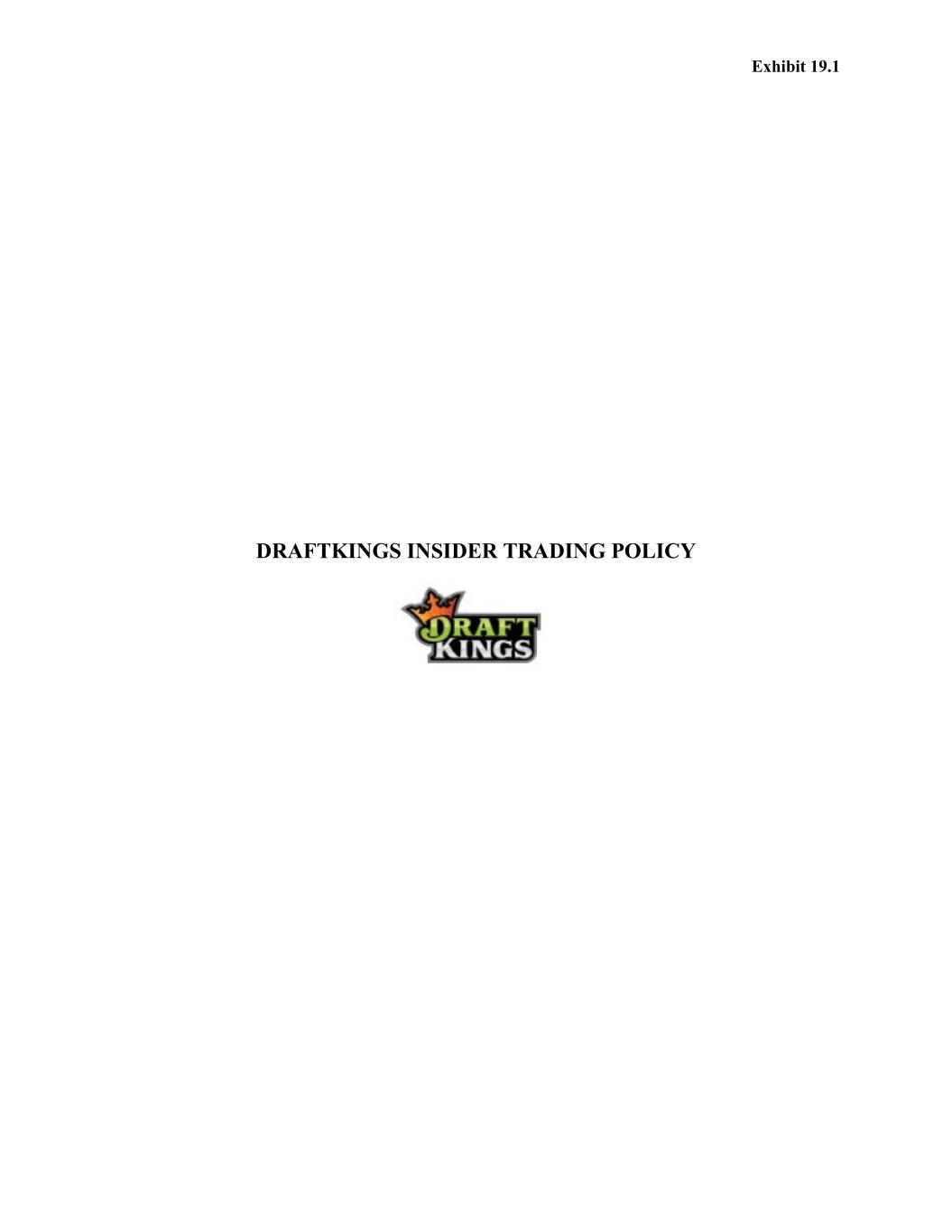
Exhibit 19.1 DRAFTKINGS INSIDER TRADING POLICY
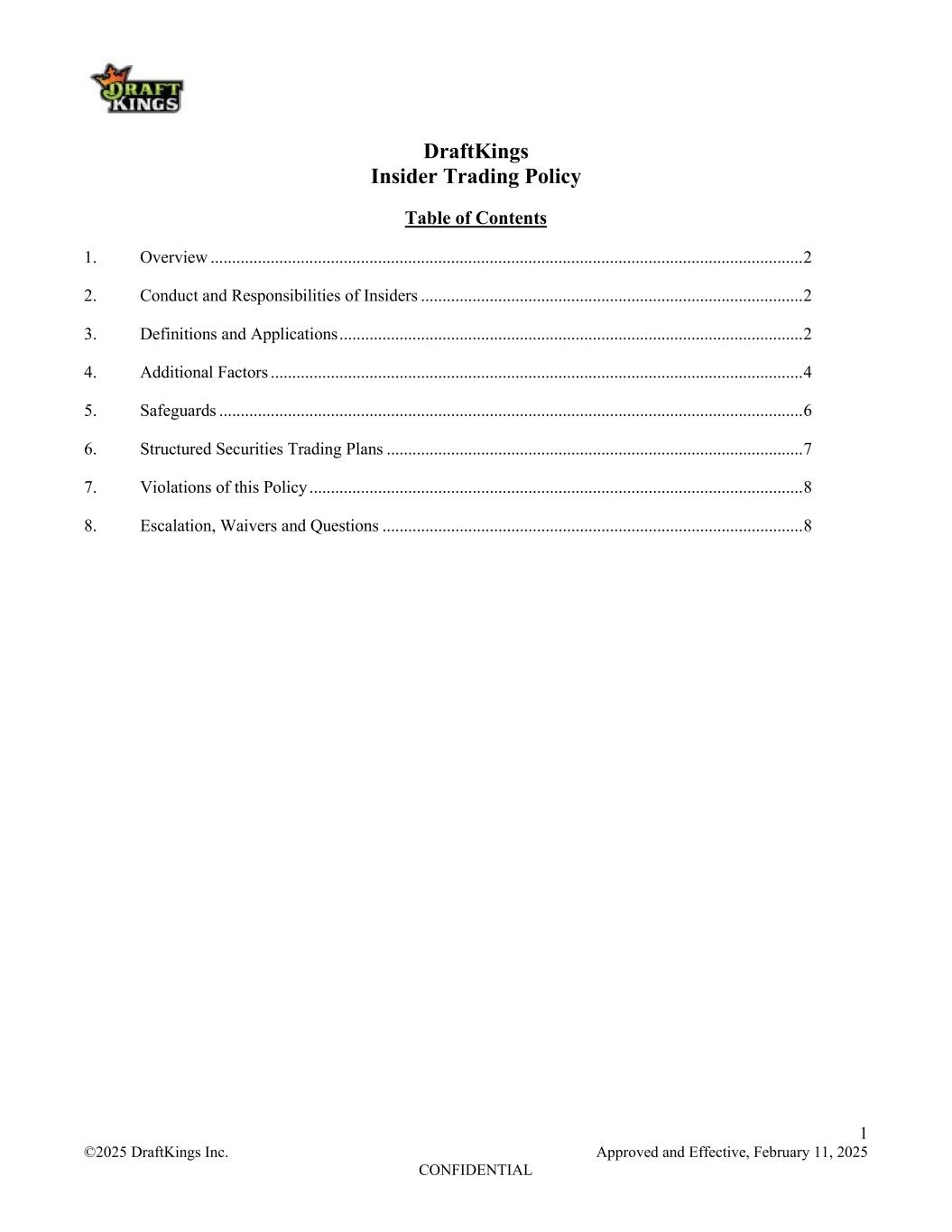
1 ©2025 DraftKings Inc. Approved and Effective, February 11, 2025 CONFIDENTIAL DraftKings Insider Trading Policy Table of Contents 1. Overview .......................................................................................................................................... 2 2. Conduct and Responsibilities of Insiders ......................................................................................... 2 3. Definitions and Applications ............................................................................................................ 2 4. Additional Factors ............................................................................................................................ 4 5. Safeguards ........................................................................................................................................ 6 6. Structured Securities Trading Plans ................................................................................................. 7 7. Violations of this Policy ................................................................................................................... 8 8. Escalation, Waivers and Questions .................................................................................................. 8
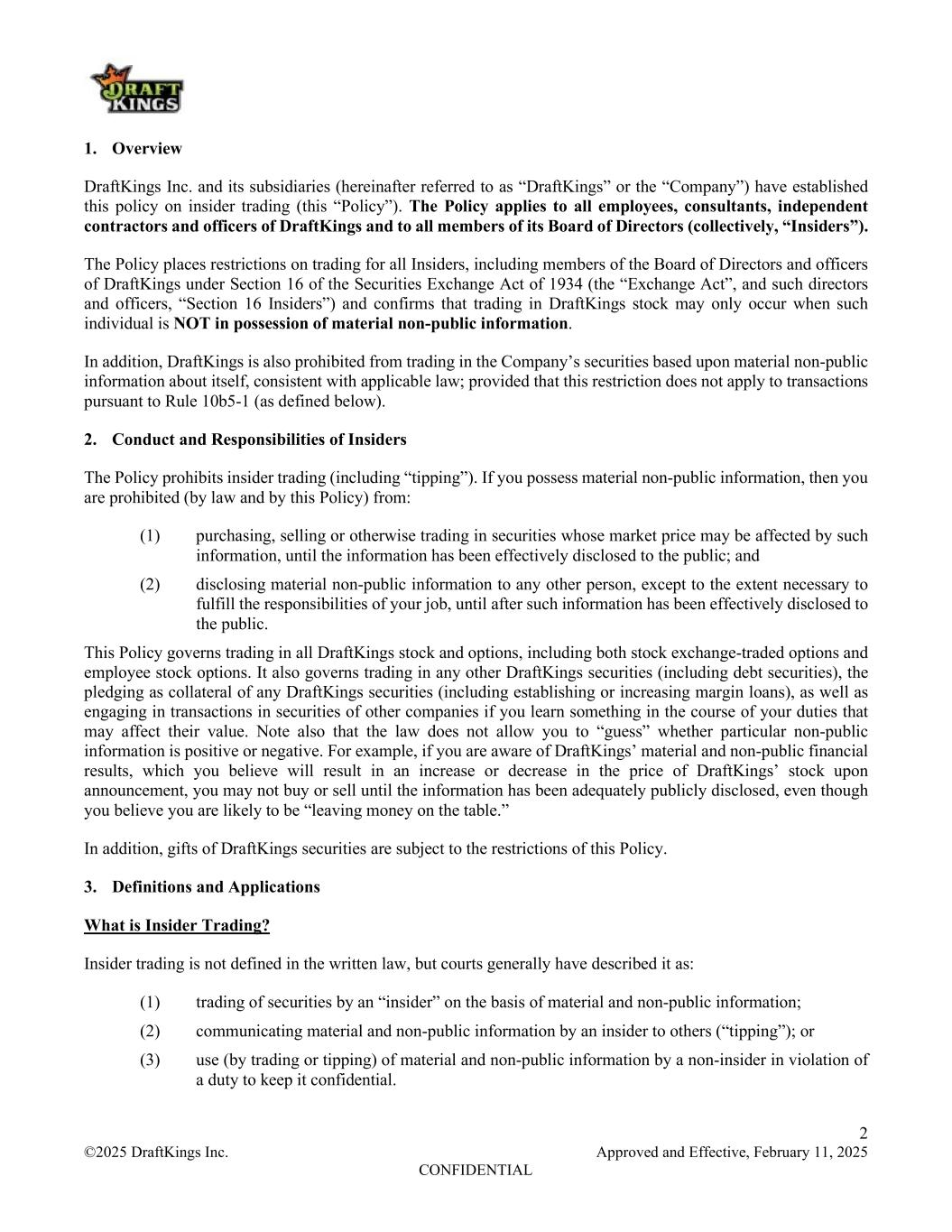
2 ©2025 DraftKings Inc. Approved and Effective, February 11, 2025 CONFIDENTIAL 1. Overview DraftKings Inc. and its subsidiaries (hereinafter referred to as “DraftKings” or the “Company”) have established this policy on insider trading (this “Policy”). The Policy applies to all employees, consultants, independent contractors and officers of DraftKings and to all members of its Board of Directors (collectively, “Insiders”). The Policy places restrictions on trading for all Insiders, including members of the Board of Directors and officers of DraftKings under Section 16 of the Securities Exchange Act of 1934 (the “Exchange Act”, and such directors and officers, “Section 16 Insiders”) and confirms that trading in DraftKings stock may only occur when such individual is NOT in possession of material non-public information. In addition, DraftKings is also prohibited from trading in the Company’s securities based upon material non-public information about itself, consistent with applicable law; provided that this restriction does not apply to transactions pursuant to Rule 10b5-1 (as defined below). 2. Conduct and Responsibilities of Insiders The Policy prohibits insider trading (including “tipping”). If you possess material non-public information, then you are prohibited (by law and by this Policy) from: (1) purchasing, selling or otherwise trading in securities whose market price may be affected by such information, until the information has been effectively disclosed to the public; and (2) disclosing material non-public information to any other person, except to the extent necessary to fulfill the responsibilities of your job, until after such information has been effectively disclosed to the public. This Policy governs trading in all DraftKings stock and options, including both stock exchange-traded options and employee stock options. It also governs trading in any other DraftKings securities (including debt securities), the pledging as collateral of any DraftKings securities (including establishing or increasing margin loans), as well as engaging in transactions in securities of other companies if you learn something in the course of your duties that may affect their value. Note also that the law does not allow you to “guess” whether particular non-public information is positive or negative. For example, if you are aware of DraftKings’ material and non-public financial results, which you believe will result in an increase or decrease in the price of DraftKings’ stock upon announcement, you may not buy or sell until the information has been adequately publicly disclosed, even though you believe you are likely to be “leaving money on the table.” In addition, gifts of DraftKings securities are subject to the restrictions of this Policy. 3. Definitions and Applications What is Insider Trading? Insider trading is not defined in the written law, but courts generally have described it as: (1) trading of securities by an “insider” on the basis of material and non-public information; (2) communicating material and non-public information by an insider to others (“tipping”); or (3) use (by trading or tipping) of material and non-public information by a non-insider in violation of a duty to keep it confidential.
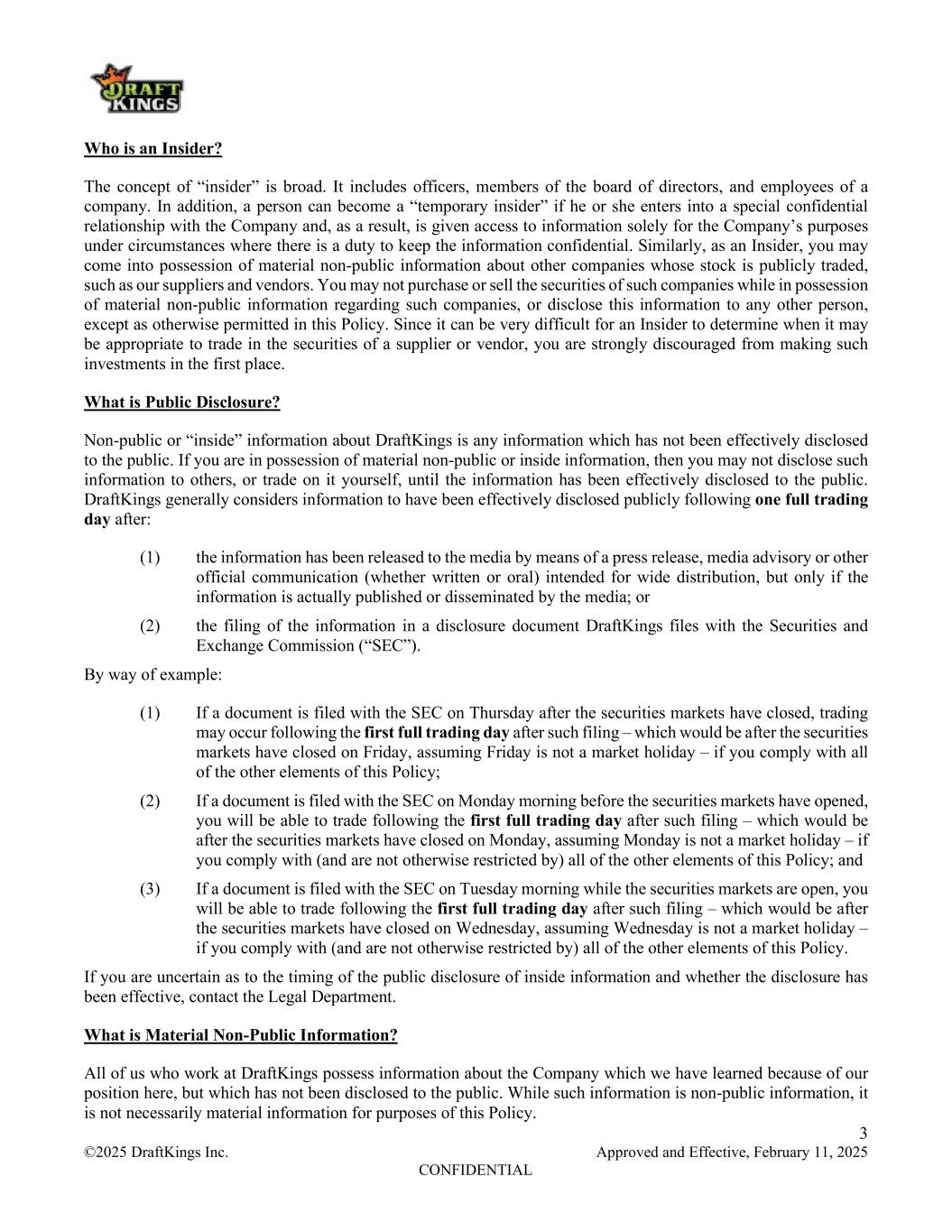
3 ©2025 DraftKings Inc. Approved and Effective, February 11, 2025 CONFIDENTIAL Who is an Insider? The concept of “insider” is broad. It includes officers, members of the board of directors, and employees of a company. In addition, a person can become a “temporary insider” if he or she enters into a special confidential relationship with the Company and, as a result, is given access to information solely for the Company’s purposes under circumstances where there is a duty to keep the information confidential. Similarly, as an Insider, you may come into possession of material non-public information about other companies whose stock is publicly traded, such as our suppliers and vendors. You may not purchase or sell the securities of such companies while in possession of material non-public information regarding such companies, or disclose this information to any other person, except as otherwise permitted in this Policy. Since it can be very difficult for an Insider to determine when it may be appropriate to trade in the securities of a supplier or vendor, you are strongly discouraged from making such investments in the first place. What is Public Disclosure? Non-public or “inside” information about DraftKings is any information which has not been effectively disclosed to the public. If you are in possession of material non-public or inside information, then you may not disclose such information to others, or trade on it yourself, until the information has been effectively disclosed to the public. DraftKings generally considers information to have been effectively disclosed publicly following one full trading day after: (1) the information has been released to the media by means of a press release, media advisory or other official communication (whether written or oral) intended for wide distribution, but only if the information is actually published or disseminated by the media; or (2) the filing of the information in a disclosure document DraftKings files with the Securities and Exchange Commission (“SEC”). By way of example: (1) If a document is filed with the SEC on Thursday after the securities markets have closed, trading may occur following the first full trading day after such filing – which would be after the securities markets have closed on Friday, assuming Friday is not a market holiday – if you comply with all of the other elements of this Policy; (2) If a document is filed with the SEC on Monday morning before the securities markets have opened, you will be able to trade following the first full trading day after such filing – which would be after the securities markets have closed on Monday, assuming Monday is not a market holiday – if you comply with (and are not otherwise restricted by) all of the other elements of this Policy; and (3) If a document is filed with the SEC on Tuesday morning while the securities markets are open, you will be able to trade following the first full trading day after such filing – which would be after the securities markets have closed on Wednesday, assuming Wednesday is not a market holiday – if you comply with (and are not otherwise restricted by) all of the other elements of this Policy. If you are uncertain as to the timing of the public disclosure of inside information and whether the disclosure has been effective, contact the Legal Department. What is Material Non-Public Information? All of us who work at DraftKings possess information about the Company which we have learned because of our position here, but which has not been disclosed to the public. While such information is non-public information, it is not necessarily material information for purposes of this Policy.
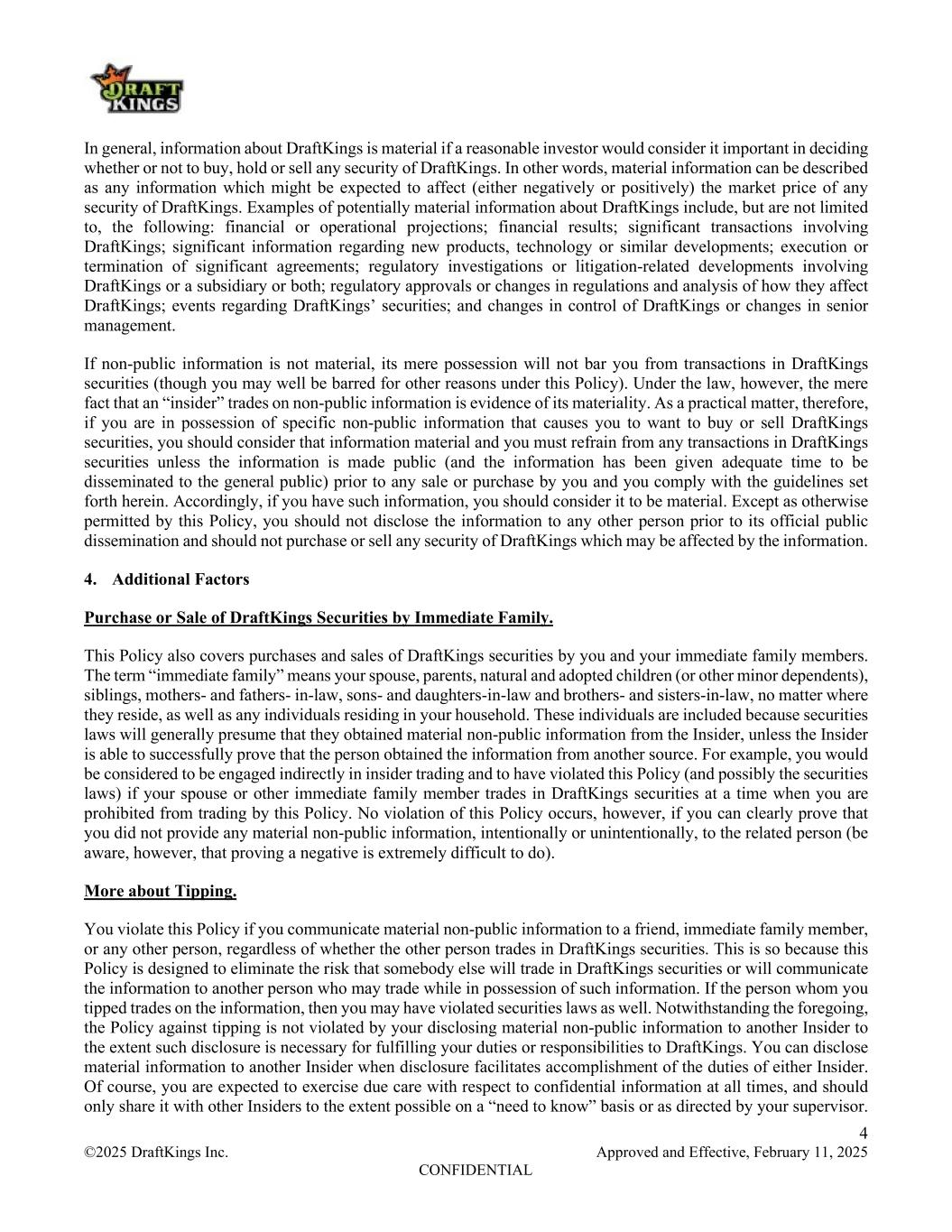
4 ©2025 DraftKings Inc. Approved and Effective, February 11, 2025 CONFIDENTIAL In general, information about DraftKings is material if a reasonable investor would consider it important in deciding whether or not to buy, hold or sell any security of DraftKings. In other words, material information can be described as any information which might be expected to affect (either negatively or positively) the market price of any security of DraftKings. Examples of potentially material information about DraftKings include, but are not limited to, the following: financial or operational projections; financial results; significant transactions involving DraftKings; significant information regarding new products, technology or similar developments; execution or termination of significant agreements; regulatory investigations or litigation-related developments involving DraftKings or a subsidiary or both; regulatory approvals or changes in regulations and analysis of how they affect DraftKings; events regarding DraftKings’ securities; and changes in control of DraftKings or changes in senior management. If non-public information is not material, its mere possession will not bar you from transactions in DraftKings securities (though you may well be barred for other reasons under this Policy). Under the law, however, the mere fact that an “insider” trades on non-public information is evidence of its materiality. As a practical matter, therefore, if you are in possession of specific non-public information that causes you to want to buy or sell DraftKings securities, you should consider that information material and you must refrain from any transactions in DraftKings securities unless the information is made public (and the information has been given adequate time to be disseminated to the general public) prior to any sale or purchase by you and you comply with the guidelines set forth herein. Accordingly, if you have such information, you should consider it to be material. Except as otherwise permitted by this Policy, you should not disclose the information to any other person prior to its official public dissemination and should not purchase or sell any security of DraftKings which may be affected by the information. 4. Additional Factors Purchase or Sale of DraftKings Securities by Immediate Family. This Policy also covers purchases and sales of DraftKings securities by you and your immediate family members. The term “immediate family” means your spouse, parents, natural and adopted children (or other minor dependents), siblings, mothers- and fathers- in-law, sons- and daughters-in-law and brothers- and sisters-in-law, no matter where they reside, as well as any individuals residing in your household. These individuals are included because securities laws will generally presume that they obtained material non-public information from the Insider, unless the Insider is able to successfully prove that the person obtained the information from another source. For example, you would be considered to be engaged indirectly in insider trading and to have violated this Policy (and possibly the securities laws) if your spouse or other immediate family member trades in DraftKings securities at a time when you are prohibited from trading by this Policy. No violation of this Policy occurs, however, if you can clearly prove that you did not provide any material non-public information, intentionally or unintentionally, to the related person (be aware, however, that proving a negative is extremely difficult to do). More about Tipping. You violate this Policy if you communicate material non-public information to a friend, immediate family member, or any other person, regardless of whether the other person trades in DraftKings securities. This is so because this Policy is designed to eliminate the risk that somebody else will trade in DraftKings securities or will communicate the information to another person who may trade while in possession of such information. If the person whom you tipped trades on the information, then you may have violated securities laws as well. Notwithstanding the foregoing, the Policy against tipping is not violated by your disclosing material non-public information to another Insider to the extent such disclosure is necessary for fulfilling your duties or responsibilities to DraftKings. You can disclose material information to another Insider when disclosure facilitates accomplishment of the duties of either Insider. Of course, you are expected to exercise due care with respect to confidential information at all times, and should only share it with other Insiders to the extent possible on a “need to know” basis or as directed by your supervisor.
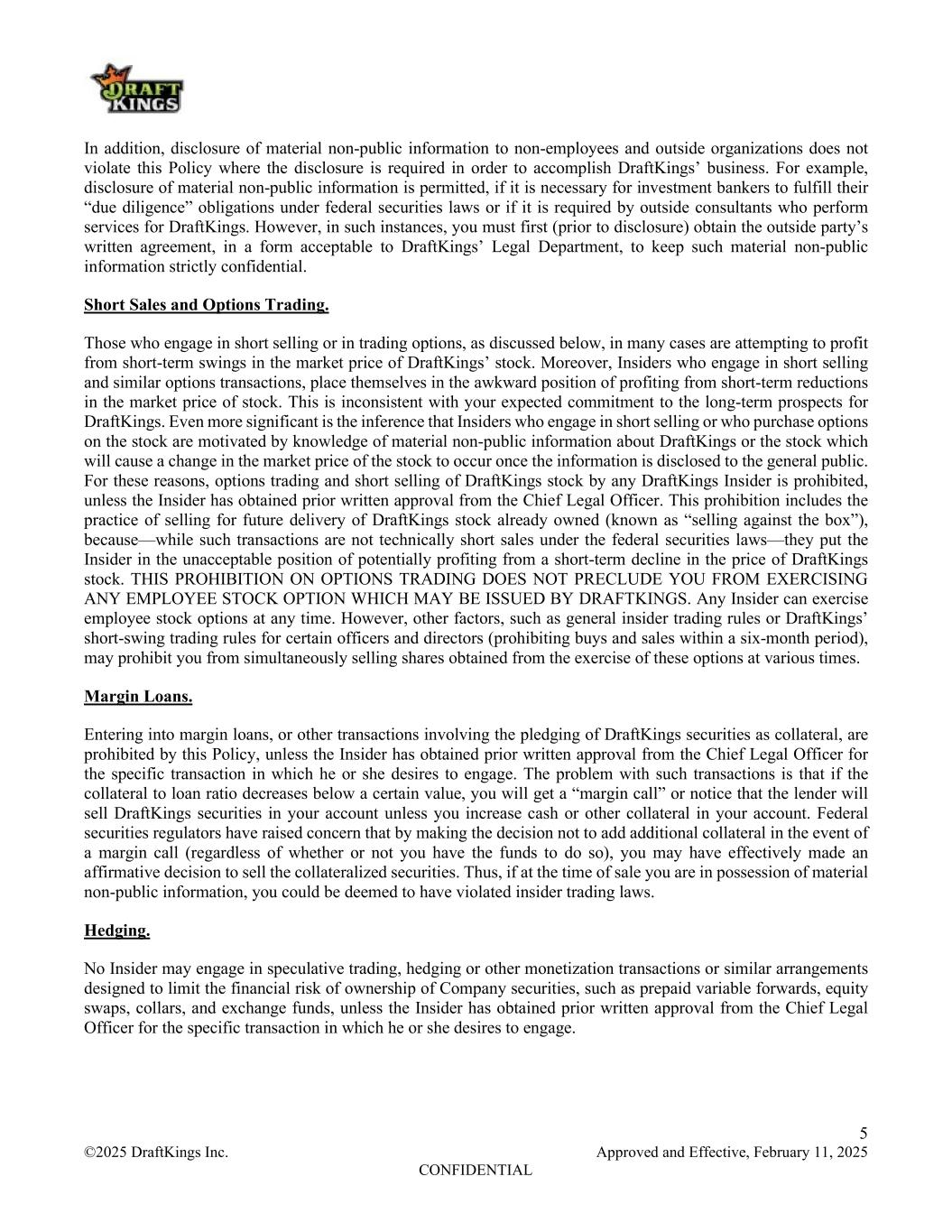
5 ©2025 DraftKings Inc. Approved and Effective, February 11, 2025 CONFIDENTIAL In addition, disclosure of material non-public information to non-employees and outside organizations does not violate this Policy where the disclosure is required in order to accomplish DraftKings’ business. For example, disclosure of material non-public information is permitted, if it is necessary for investment bankers to fulfill their “due diligence” obligations under federal securities laws or if it is required by outside consultants who perform services for DraftKings. However, in such instances, you must first (prior to disclosure) obtain the outside party’s written agreement, in a form acceptable to DraftKings’ Legal Department, to keep such material non-public information strictly confidential. Short Sales and Options Trading. Those who engage in short selling or in trading options, as discussed below, in many cases are attempting to profit from short-term swings in the market price of DraftKings’ stock. Moreover, Insiders who engage in short selling and similar options transactions, place themselves in the awkward position of profiting from short-term reductions in the market price of stock. This is inconsistent with your expected commitment to the long-term prospects for DraftKings. Even more significant is the inference that Insiders who engage in short selling or who purchase options on the stock are motivated by knowledge of material non-public information about DraftKings or the stock which will cause a change in the market price of the stock to occur once the information is disclosed to the general public. For these reasons, options trading and short selling of DraftKings stock by any DraftKings Insider is prohibited, unless the Insider has obtained prior written approval from the Chief Legal Officer. This prohibition includes the practice of selling for future delivery of DraftKings stock already owned (known as “selling against the box”), because––while such transactions are not technically short sales under the federal securities laws––they put the Insider in the unacceptable position of potentially profiting from a short-term decline in the price of DraftKings stock. THIS PROHIBITION ON OPTIONS TRADING DOES NOT PRECLUDE YOU FROM EXERCISING ANY EMPLOYEE STOCK OPTION WHICH MAY BE ISSUED BY DRAFTKINGS. Any Insider can exercise employee stock options at any time. However, other factors, such as general insider trading rules or DraftKings’ short-swing trading rules for certain officers and directors (prohibiting buys and sales within a six-month period), may prohibit you from simultaneously selling shares obtained from the exercise of these options at various times. Margin Loans. Entering into margin loans, or other transactions involving the pledging of DraftKings securities as collateral, are prohibited by this Policy, unless the Insider has obtained prior written approval from the Chief Legal Officer for the specific transaction in which he or she desires to engage. The problem with such transactions is that if the collateral to loan ratio decreases below a certain value, you will get a “margin call” or notice that the lender will sell DraftKings securities in your account unless you increase cash or other collateral in your account. Federal securities regulators have raised concern that by making the decision not to add additional collateral in the event of a margin call (regardless of whether or not you have the funds to do so), you may have effectively made an affirmative decision to sell the collateralized securities. Thus, if at the time of sale you are in possession of material non-public information, you could be deemed to have violated insider trading laws. Hedging. No Insider may engage in speculative trading, hedging or other monetization transactions or similar arrangements designed to limit the financial risk of ownership of Company securities, such as prepaid variable forwards, equity swaps, collars, and exchange funds, unless the Insider has obtained prior written approval from the Chief Legal Officer for the specific transaction in which he or she desires to engage.
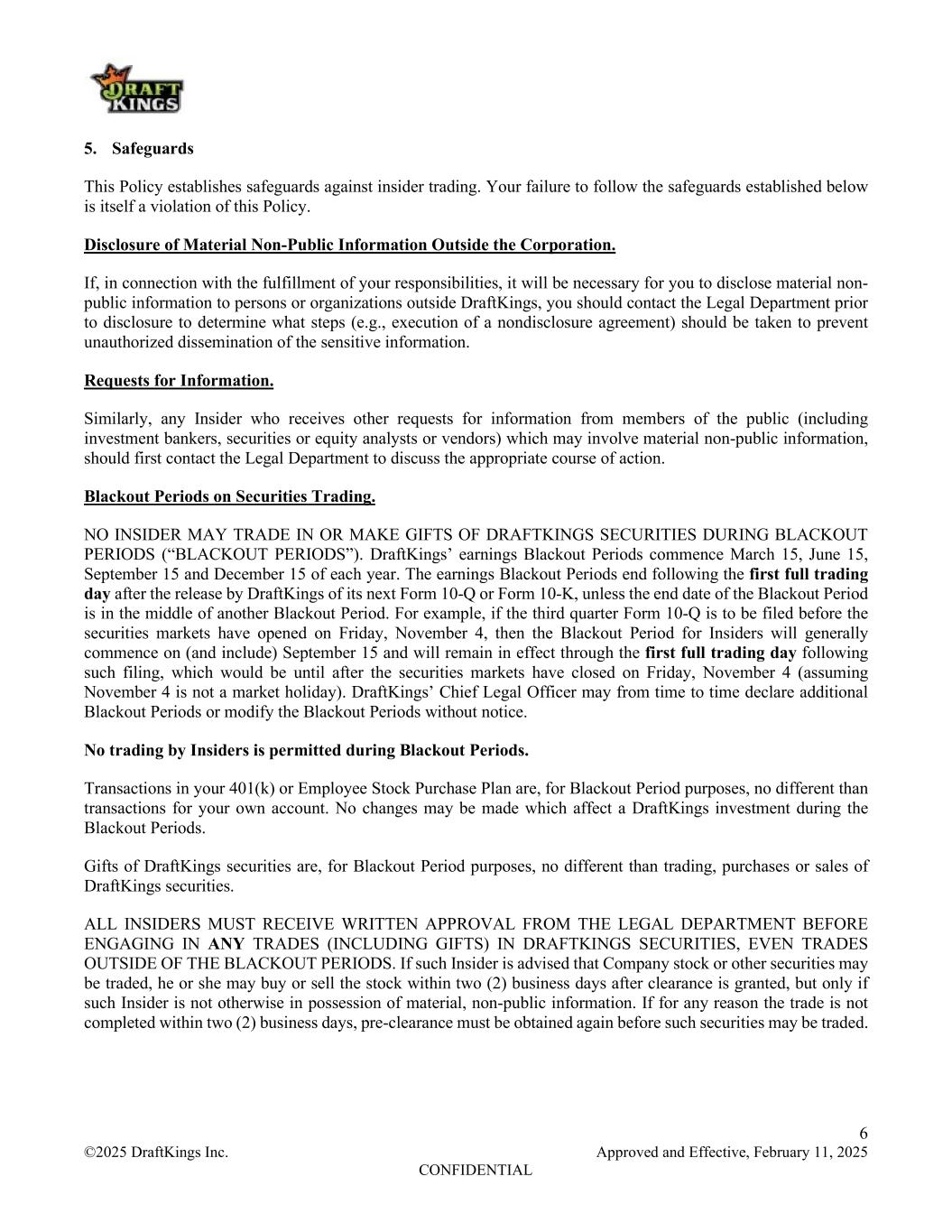
6 ©2025 DraftKings Inc. Approved and Effective, February 11, 2025 CONFIDENTIAL 5. Safeguards This Policy establishes safeguards against insider trading. Your failure to follow the safeguards established below is itself a violation of this Policy. Disclosure of Material Non-Public Information Outside the Corporation. If, in connection with the fulfillment of your responsibilities, it will be necessary for you to disclose material non- public information to persons or organizations outside DraftKings, you should contact the Legal Department prior to disclosure to determine what steps (e.g., execution of a nondisclosure agreement) should be taken to prevent unauthorized dissemination of the sensitive information. Requests for Information. Similarly, any Insider who receives other requests for information from members of the public (including investment bankers, securities or equity analysts or vendors) which may involve material non-public information, should first contact the Legal Department to discuss the appropriate course of action. Blackout Periods on Securities Trading. NO INSIDER MAY TRADE IN OR MAKE GIFTS OF DRAFTKINGS SECURITIES DURING BLACKOUT PERIODS (“BLACKOUT PERIODS”). DraftKings’ earnings Blackout Periods commence March 15, June 15, September 15 and December 15 of each year. The earnings Blackout Periods end following the first full trading day after the release by DraftKings of its next Form 10-Q or Form 10-K, unless the end date of the Blackout Period is in the middle of another Blackout Period. For example, if the third quarter Form 10-Q is to be filed before the securities markets have opened on Friday, November 4, then the Blackout Period for Insiders will generally commence on (and include) September 15 and will remain in effect through the first full trading day following such filing, which would be until after the securities markets have closed on Friday, November 4 (assuming November 4 is not a market holiday). DraftKings’ Chief Legal Officer may from time to time declare additional Blackout Periods or modify the Blackout Periods without notice. No trading by Insiders is permitted during Blackout Periods. Transactions in your 401(k) or Employee Stock Purchase Plan are, for Blackout Period purposes, no different than transactions for your own account. No changes may be made which affect a DraftKings investment during the Blackout Periods. Gifts of DraftKings securities are, for Blackout Period purposes, no different than trading, purchases or sales of DraftKings securities. ALL INSIDERS MUST RECEIVE WRITTEN APPROVAL FROM THE LEGAL DEPARTMENT BEFORE ENGAGING IN ANY TRADES (INCLUDING GIFTS) IN DRAFTKINGS SECURITIES, EVEN TRADES OUTSIDE OF THE BLACKOUT PERIODS. If such Insider is advised that Company stock or other securities may be traded, he or she may buy or sell the stock within two (2) business days after clearance is granted, but only if such Insider is not otherwise in possession of material, non-public information. If for any reason the trade is not completed within two (2) business days, pre-clearance must be obtained again before such securities may be traded.
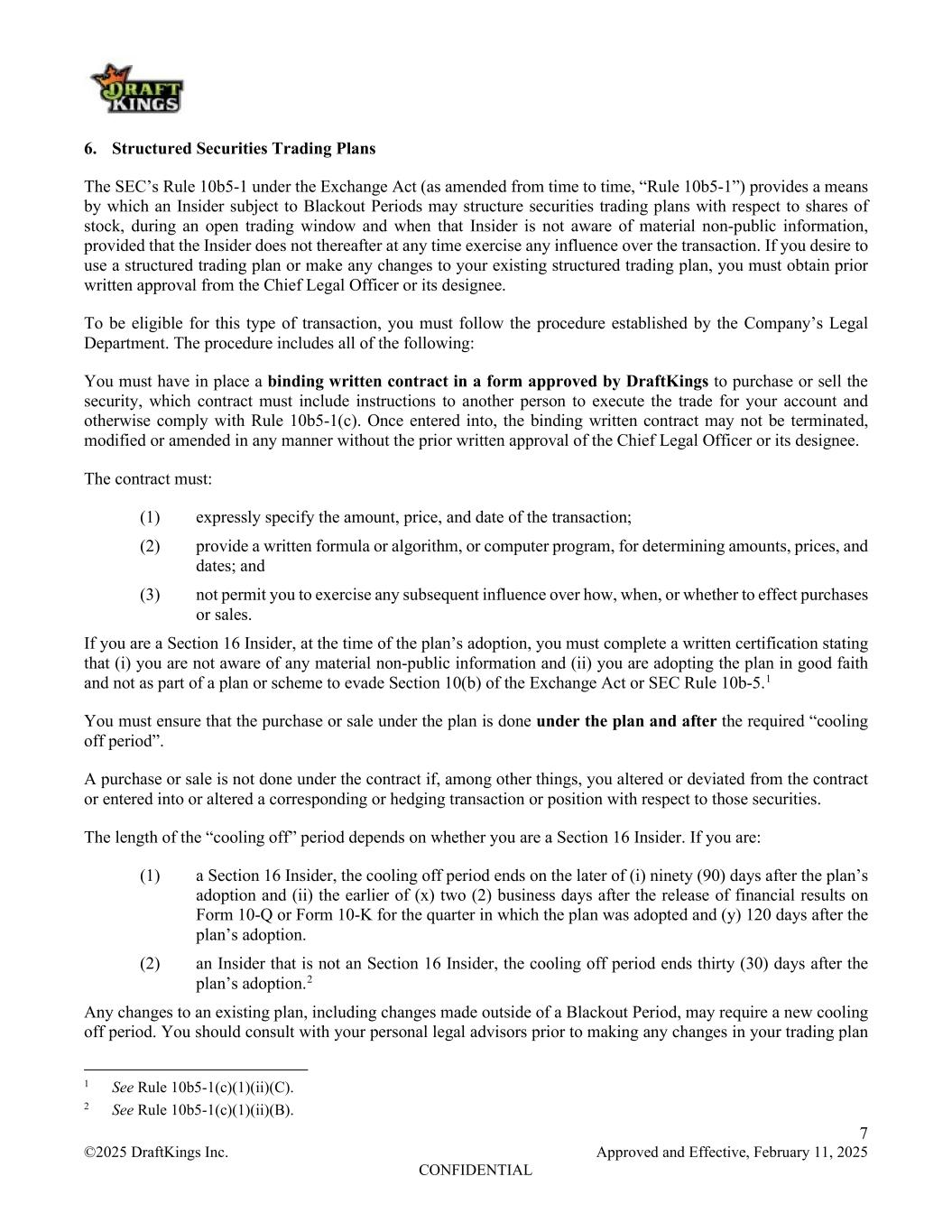
7 ©2025 DraftKings Inc. Approved and Effective, February 11, 2025 CONFIDENTIAL 6. Structured Securities Trading Plans The SEC’s Rule 10b5-1 under the Exchange Act (as amended from time to time, “Rule 10b5-1”) provides a means by which an Insider subject to Blackout Periods may structure securities trading plans with respect to shares of stock, during an open trading window and when that Insider is not aware of material non-public information, provided that the Insider does not thereafter at any time exercise any influence over the transaction. If you desire to use a structured trading plan or make any changes to your existing structured trading plan, you must obtain prior written approval from the Chief Legal Officer or its designee. To be eligible for this type of transaction, you must follow the procedure established by the Company’s Legal Department. The procedure includes all of the following: You must have in place a binding written contract in a form approved by DraftKings to purchase or sell the security, which contract must include instructions to another person to execute the trade for your account and otherwise comply with Rule 10b5-1(c). Once entered into, the binding written contract may not be terminated, modified or amended in any manner without the prior written approval of the Chief Legal Officer or its designee. The contract must: (1) expressly specify the amount, price, and date of the transaction; (2) provide a written formula or algorithm, or computer program, for determining amounts, prices, and dates; and (3) not permit you to exercise any subsequent influence over how, when, or whether to effect purchases or sales. If you are a Section 16 Insider, at the time of the plan’s adoption, you must complete a written certification stating that (i) you are not aware of any material non-public information and (ii) you are adopting the plan in good faith and not as part of a plan or scheme to evade Section 10(b) of the Exchange Act or SEC Rule 10b-5.1 You must ensure that the purchase or sale under the plan is done under the plan and after the required “cooling off period”. A purchase or sale is not done under the contract if, among other things, you altered or deviated from the contract or entered into or altered a corresponding or hedging transaction or position with respect to those securities. The length of the “cooling off” period depends on whether you are a Section 16 Insider. If you are: (1) a Section 16 Insider, the cooling off period ends on the later of (i) ninety (90) days after the plan’s adoption and (ii) the earlier of (x) two (2) business days after the release of financial results on Form 10-Q or Form 10-K for the quarter in which the plan was adopted and (y) 120 days after the plan’s adoption. (2) an Insider that is not an Section 16 Insider, the cooling off period ends thirty (30) days after the plan’s adoption.2 Any changes to an existing plan, including changes made outside of a Blackout Period, may require a new cooling off period. You should consult with your personal legal advisors prior to making any changes in your trading plan 1 See Rule 10b5-1(c)(1)(ii)(C). 2 See Rule 10b5-1(c)(1)(ii)(B).
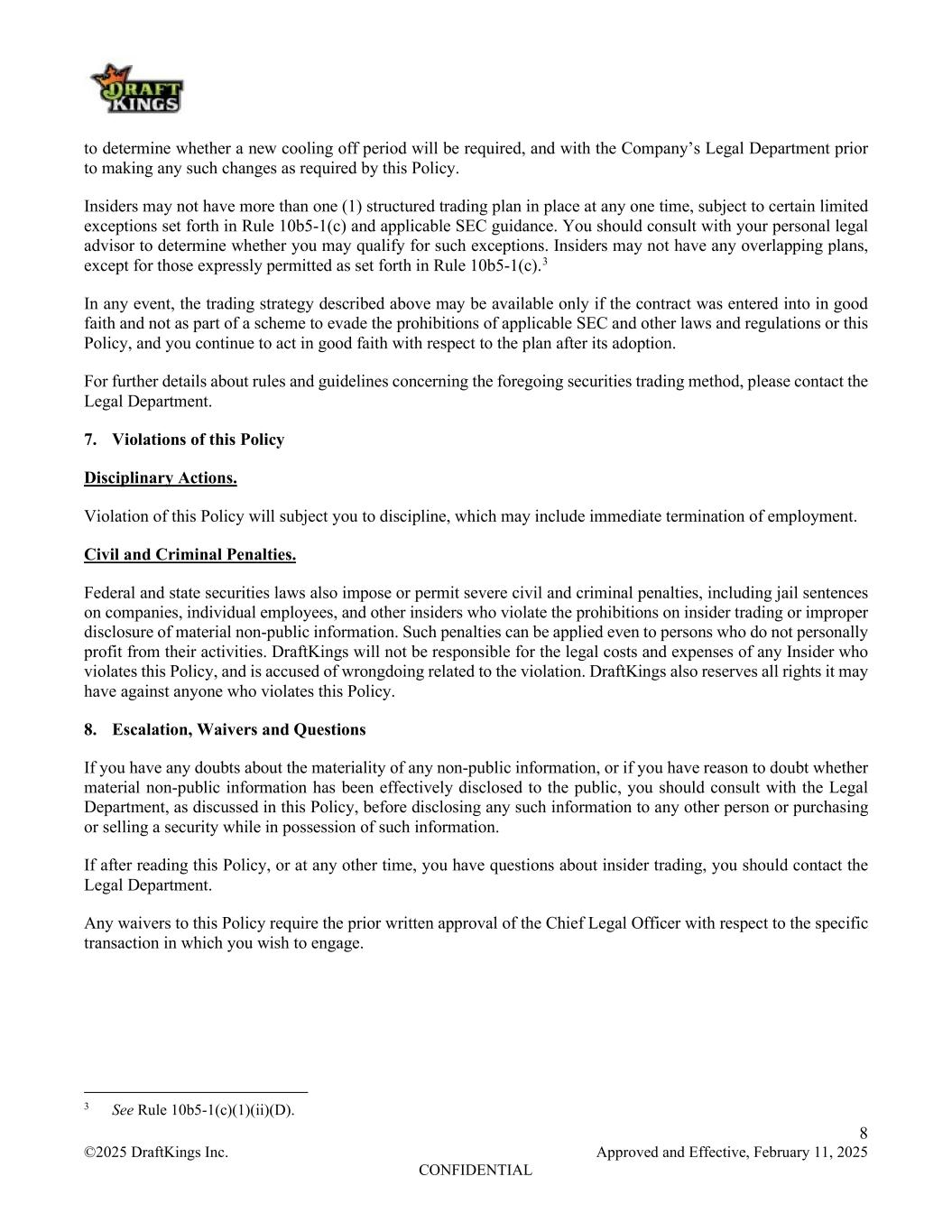
8 ©2025 DraftKings Inc. Approved and Effective, February 11, 2025 CONFIDENTIAL to determine whether a new cooling off period will be required, and with the Company’s Legal Department prior to making any such changes as required by this Policy. Insiders may not have more than one (1) structured trading plan in place at any one time, subject to certain limited exceptions set forth in Rule 10b5-1(c) and applicable SEC guidance. You should consult with your personal legal advisor to determine whether you may qualify for such exceptions. Insiders may not have any overlapping plans, except for those expressly permitted as set forth in Rule 10b5-1(c).3 In any event, the trading strategy described above may be available only if the contract was entered into in good faith and not as part of a scheme to evade the prohibitions of applicable SEC and other laws and regulations or this Policy, and you continue to act in good faith with respect to the plan after its adoption. For further details about rules and guidelines concerning the foregoing securities trading method, please contact the Legal Department. 7. Violations of this Policy Disciplinary Actions. Violation of this Policy will subject you to discipline, which may include immediate termination of employment. Civil and Criminal Penalties. Federal and state securities laws also impose or permit severe civil and criminal penalties, including jail sentences on companies, individual employees, and other insiders who violate the prohibitions on insider trading or improper disclosure of material non-public information. Such penalties can be applied even to persons who do not personally profit from their activities. DraftKings will not be responsible for the legal costs and expenses of any Insider who violates this Policy, and is accused of wrongdoing related to the violation. DraftKings also reserves all rights it may have against anyone who violates this Policy. 8. Escalation, Waivers and Questions If you have any doubts about the materiality of any non-public information, or if you have reason to doubt whether material non-public information has been effectively disclosed to the public, you should consult with the Legal Department, as discussed in this Policy, before disclosing any such information to any other person or purchasing or selling a security while in possession of such information. If after reading this Policy, or at any other time, you have questions about insider trading, you should contact the Legal Department. Any waivers to this Policy require the prior written approval of the Chief Legal Officer with respect to the specific transaction in which you wish to engage. 3 See Rule 10b5-1(c)(1)(ii)(D).